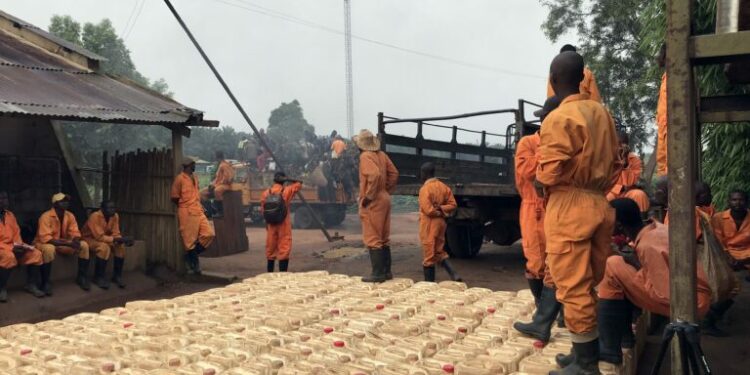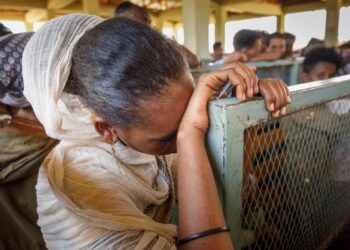– How are local communities and activists intensifying pressure on EU lenders in relation to PHC?
Communities in the Democratic Republic of the Congo (DRC) are intensifying their pressure on European Union (EU) lenders to withhold funding for the palm oil giant PHC. The company has been the subject of criticisms due to its alleged human rights abuses and environmental impact, prompting local communities and activists to take action and demand accountability. This article will delve into the details of this pressing issue and the efforts being made to address it.
Background on PHC and Palm Oil Industry in DRC
PHC, also known as Feronia Inc., is a Canadian agribusiness company that operates in the DRC. It focuses on palm oil production and has been active in the region for several decades. The palm oil industry in the DRC has been a source of controversy due to its negative impact on the environment, as well as its alleged exploitation of local communities and workers.
Issues Surrounding PHC
The DRC has been a hotspot for land grabbing and human rights violations in the name of industrial agriculture. PHC has been accused of displacing local communities, exploiting workers, and failing to adhere to environmental regulations. These allegations have sparked outrage among local activists and international organizations, leading to calls for tighter regulations and accountability for the company’s actions.
Intensifying Pressure on EU Lenders
Communities in the DRC, along with environmental and human rights activists, are intensifying their efforts to pressure EU lenders to withhold funding for PHC. The company has reportedly sought financial support from European development finance institutions, raising concerns about the potential complicity of these lenders in the alleged abuses linked to PHC’s operations.
Calls for Transparency and Accountability
Local communities and activists are demanding transparency and accountability from both PHC and the EU lenders. They are calling for thorough investigations into the company’s practices, as well as the adoption of rigorous social and environmental safeguards by financial institutions to prevent further harm to the affected communities and the environment.
Campaigns and Advocacy Efforts
Several campaigns and advocacy efforts are being mobilized to raise awareness about the situation and to exert pressure on EU lenders. This includes lobbying efforts, public awareness campaigns, and legal actions aimed at holding PHC and the lenders accountable for their roles in the alleged abuses in the DRC.
Importance of Sustainable Practices
The intensifying pressure on EU lenders for funding PHC highlights the urgent need for sustainable and responsible practices in the palm oil industry. It underscores the importance of upholding human rights, protecting the environment, and ensuring the well-being of local communities in regions where palm oil production takes place.
The Role of EU Lenders in Promoting Sustainable Development
EU lenders have a crucial role to play in promoting sustainable development in the DRC and other palm oil-producing regions. By exercising due diligence in their investment decisions and prioritizing social and environmental considerations, they can contribute to fostering responsible business practices and mitigating the negative impacts associated with palm oil production.
Conclusion
The intensifying pressure on EU lenders to withhold funding for PHC reflects a growing movement toward greater accountability and sustainability in the palm oil industry. It signals a collective effort to address the social, environmental, and human rights concerns linked to palm oil production in the DRC. By amplifying the voices of affected communities and advocating for responsible investment practices, stakeholders are working towards a future where palm oil production is conducted in a manner that respects human rights, preserves the environment, and benefits local communities.
Communities living near oil palm plantations in the northeast of the Democratic Republic of Congo are accusing several European development banks, including Germany’s DEG, of financially supporting a PHC land grab in the DRC through $150 million in loans. These communities, on just over 58,000 hectares (143,000 acres) of land argue that it is illegally occupied- as its boundaries have not been agreed upon with PHC.
The conflict has even escalated to violence – members from a local community clashed with security guards at PHC’s oil palm plantation at Lokutu. This is not an isolated incident: clashes between other local communities and security guards have also resulted in fatalities.
From another perspective and further back in history, Lokutu and two other plantations managed by Plantations et Huileries du Congo (PHC); Boteka and Yaligimba are at heart of this crisis- they all cover more than 107,000 hectares (264,000 acres) across the country. People from these regions argue that these lands were forcibly taken by Belgian colonial authorities to establish palm oil plantations. Nearly 50 years after gaining independece from Belgium after World War II., locals remain concerned about unfair compensation for their ancestral lands as they continue to be exploited for profit or foreign investors; Human Rights Watch reports dangerous conditions for workers due to pesticide exposure.
Jean-François Mombia Atuku explains that Unilever’s arrival over a century ago was followed by hundreds of years under corporate control where workforce shortages were filled unfairly leading diseases and poor education.Tensions have only risen since NY-based investment company Kuramo Capitol Management acquired PHC often using arbitrary arrests against protestors.
RIAO-RDC has called out international financing organizations such as foundations who continue funding PHC despite human rights violations. The organization brings together over 250 organizations fighting to protect the rights affected by this conflict.Exploitation of Local Communities by Palm Oil Producers
Palm oil has become an essential staple in our world’s food supply, but at what cost? Workers who cultivate the oil palm fruit face grueling conditions without proper protective equipment. In fact, communities in Lokutu, Boteka, and Yaligimba have been embroiled in a long-standing battle over land rights with PHC (Plantations et Huileries du Congo), a company funded by large European development banks.
Devlin Kuyek from GRAIN has raised concerns about a mediation process that has failed to address the fundamental issue of land grabbing. The lack of access to official land concession documents and inadequate financial transparency from PHC has hindered any meaningful resolution. Civil society organizations have also called for the suspension of the mediation process until communities can access these critical documents and receive legal support.
The conflict escalates as local communities have accused Unilever and PHC of leveraging colonial tactics to strip them of their ancestral lands. Their efforts to reclaim their territories led them to file complaints with European lenders who had struck a deal with PHC without fulfilling their own loan agreement principles regarding returning unused land back to the communities.
The independent complaints mechanism involving DEG (German development bank) and FMO (Dutch development bank) is now under scrutiny after it was revealed that key information regarding this deal was concealed. While DEG defends its investment as an effort to create jobs and improve local food supplies, questions remain about alleged environmental crimes, human rights violations, financial malfeasance, and tax evasion by PHC. Despite these allegations remaining unresolved as shareholders feud over control of the company, employment at its plantations has seen significant growth.
As part of this ongoing struggle between local farmers and palm oil producers like PHC not only happens in Central Africa but also here are examples on how Nigerian farmers continue their fight against similar practices occurring just 10 years after a major land grab.
In conclusion:
This story highlights not only the systemic issues faced by local farming communities fighting against exploitation by powerful corporations but also raises serious questions about ethical banking practices that support such endeavors. The lack of accountability for environmental destruction and human rights abuses indicates an urgent need for meaningful change within the global palm oil industry.The Importance of Regular Exercise for Overall Health
Regular exercise is essential for maintaining overall health and well-being. Engaging in physical activity has numerous benefits for the body and mind, and it plays a crucial role in preventing various health conditions. In this article, we will explore the importance of regular exercise and how it contributes to a healthy lifestyle.
Enhanced Physical Health
Regular exercise helps improve physical health in many ways. It strengthens the muscles, bones, and joints, leading to better mobility and reduced risk of injuries. Additionally, physical activity increases cardiovascular fitness, which lowers the risk of heart disease, stroke, and high blood pressure. Furthermore, regular exercise contributes to weight management by burning calories and boosting metabolism.
Improved Mental Well-Being
In addition to its physical benefits, regular exercise also has a positive impact on mental well-being. Physical activity stimulates the production of endorphins—the “feel-good” hormones—leading to reduced feelings of stress and anxiety. Moreover, engaging in regular exercise can improve sleep quality and alleviate symptoms of depression.
Prevention of Chronic Diseases
One of the most significant benefits of regular exercise is its role in preventing chronic diseases such as diabetes, cancer, and obesity. Studies have shown that individuals who engage in consistent physical activity are at a lower risk of developing these conditions. Incorporating regular exercise into one’s routine can have long-term implications for disease prevention.
Promotion of Longevity
Research indicates that individuals who maintain an active lifestyle tend to live longer than those who are sedentary. Regular exercise not only improves overall health but also extends life expectancy by reducing the likelihood of developing life-threatening illnesses.
Tips for Incorporating Exercise Into Your Routine
For those looking to reap the benefits of regular exercise but struggling with incorporating it into their daily routine,
consider starting small—taking short walks or opting for stairs instead
of elevators can be simple yet effective ways to increase physical
activity levels.
Engaging in activities you enjoy can make exercising more enjoyable
and sustainable.
Setting realistic goals and tracking progress can help individuals stay motivated on their fitness journey.
Incorporating a variety
of exercises—including cardio,
strength training,
and flexibility exercises—ensures that all aspects
of fitness are addressed.
Conclusion: Make Exercise a Priority
regular
exercise is essential for promoting overall health—it enhances physical well-being,
improves mental health,
prevents chronic diseases,
and promotes longevity.
By making conscious efforts to incorporate physical activity into your daily routine,
you can significantly improve your quality
of life
and enhance your long-term well-being.
Maintaining an active lifestyle is an investment
in your health,
and prioritizing
exercise yields countless rewards.
Additionally,
consulting with healthcare professionals or fitness experts when embarking on new
exercise routines
can provide valuable guidance
to ensure safety
And effectiveness.
Whether it’s goingfor a morning run,
attending group fitness classes,
or simply taking frequent breaks from sitting,
all forms
ofphysicalactivity contribute
positive effects
to both
the body
and
mind.
Denial of responsibility! info-blog.org is an automatic aggregator around the global media. All the content are available free on Internet. We have just arranged it in one platform for educational purpose only. In each content, the hyperlink to the primary source is specified. All trademarks belong to their rightful owners, all materials to their authors. If you are the owner of the content and do not want us to publish your materials on our website, please contact us by email – abuse@info-blog.org.. The content will be deleted within 24 hours.











